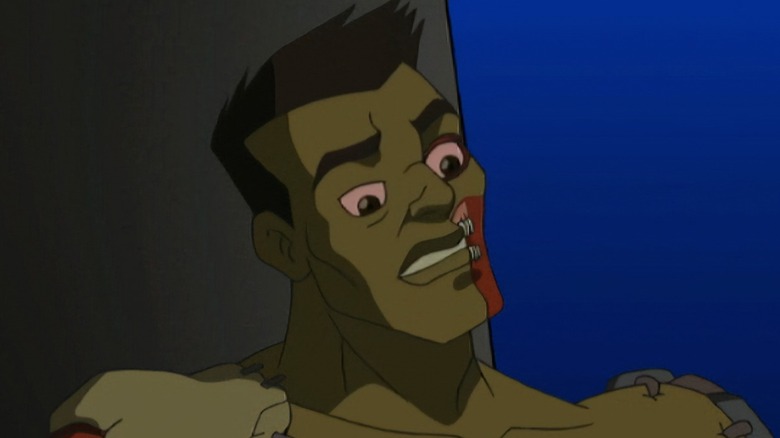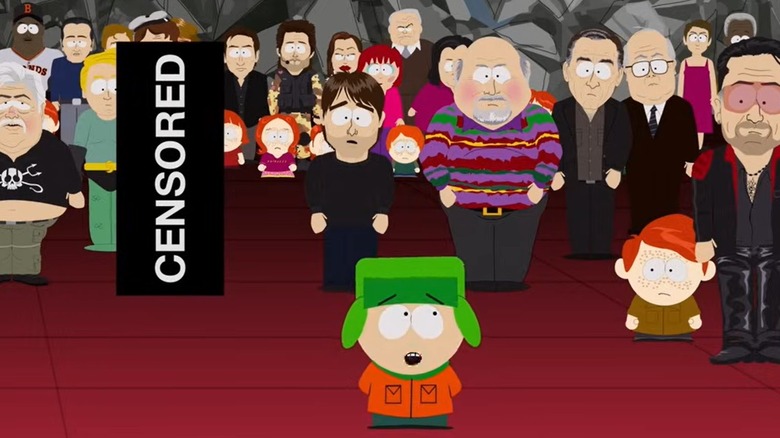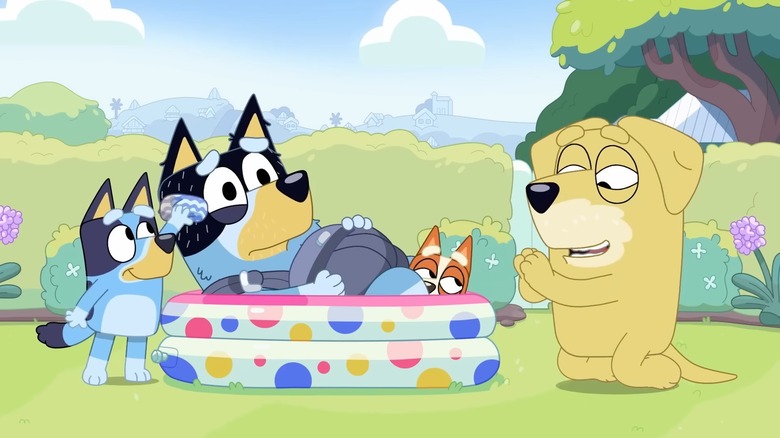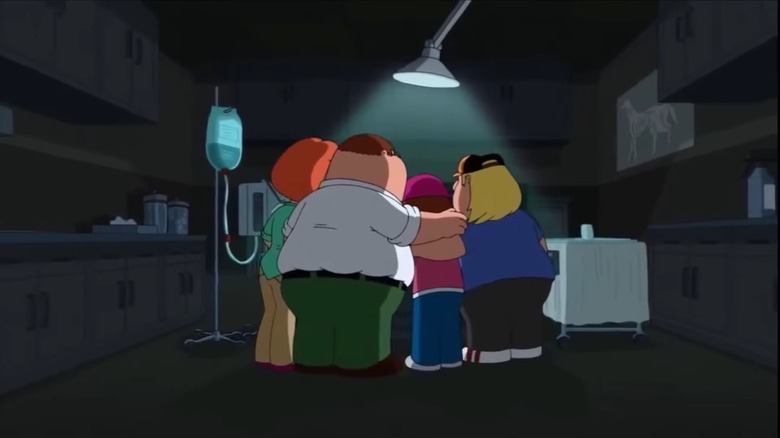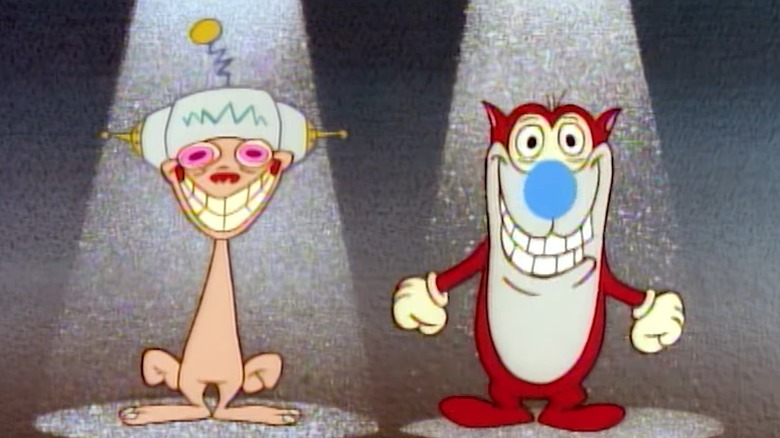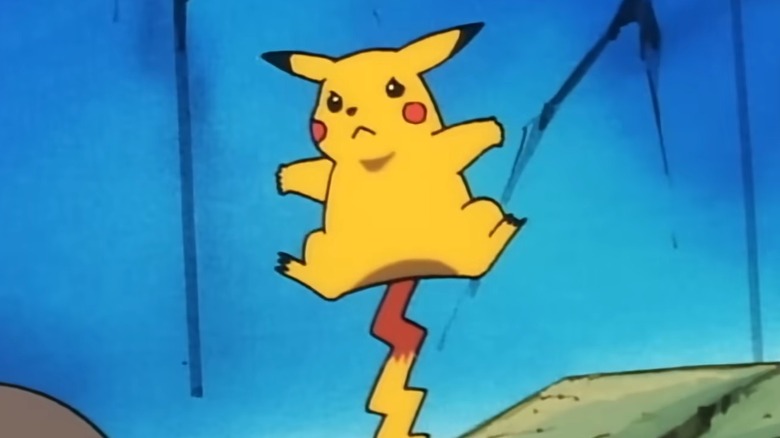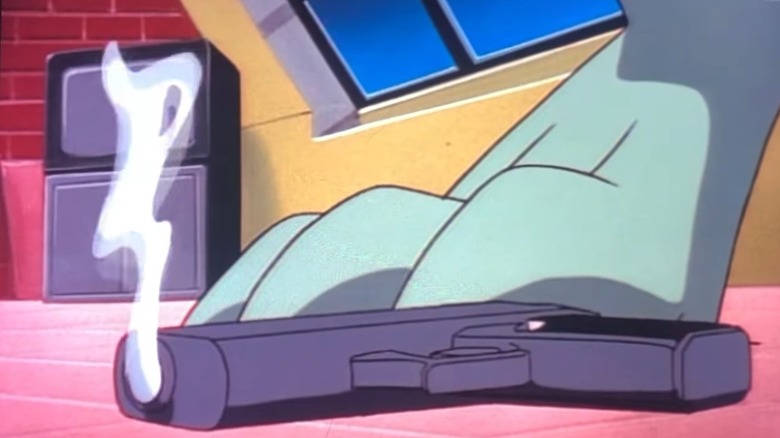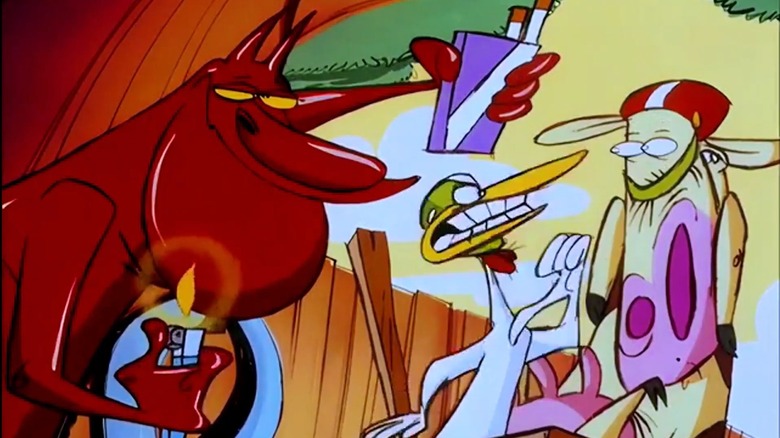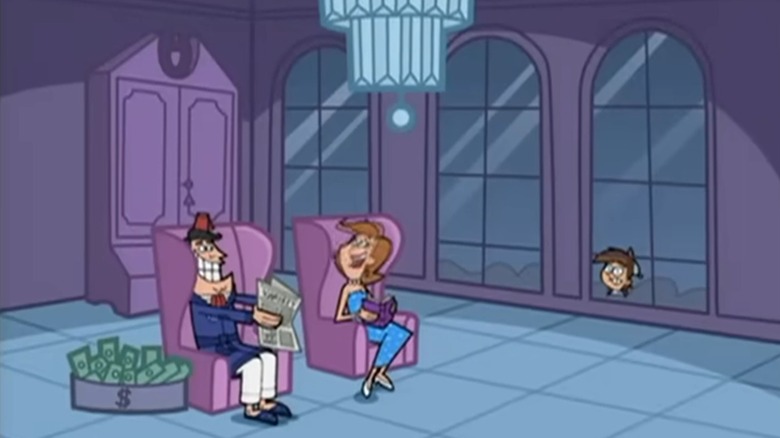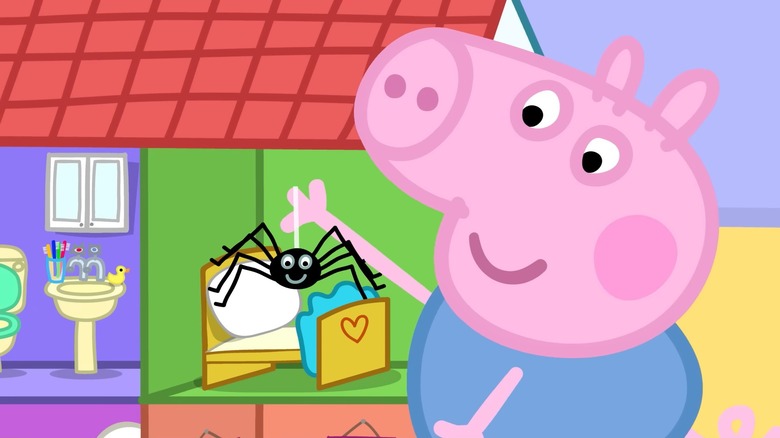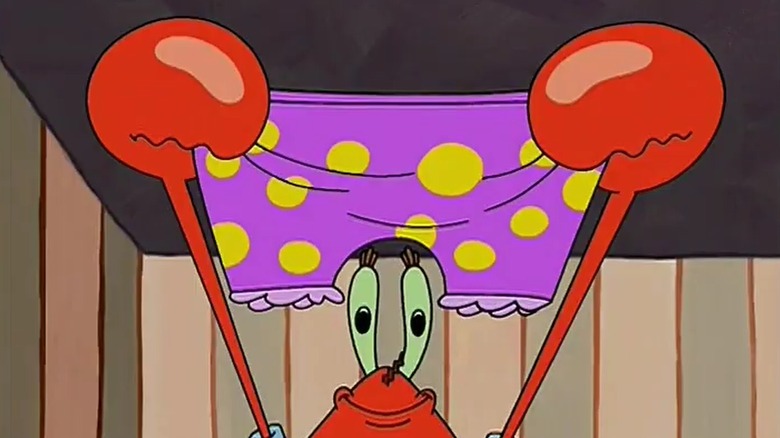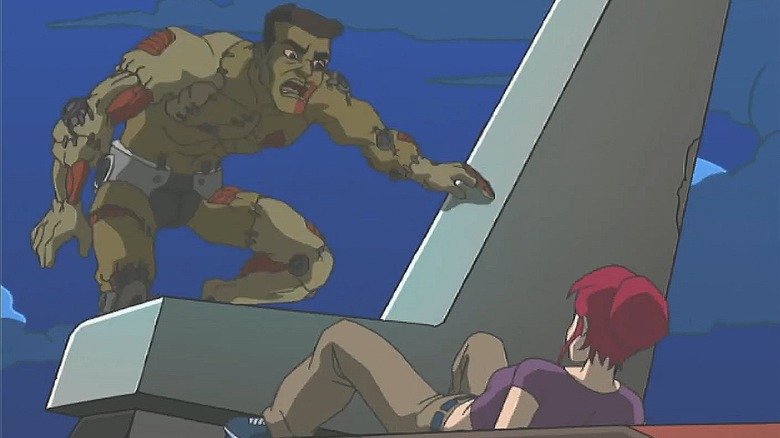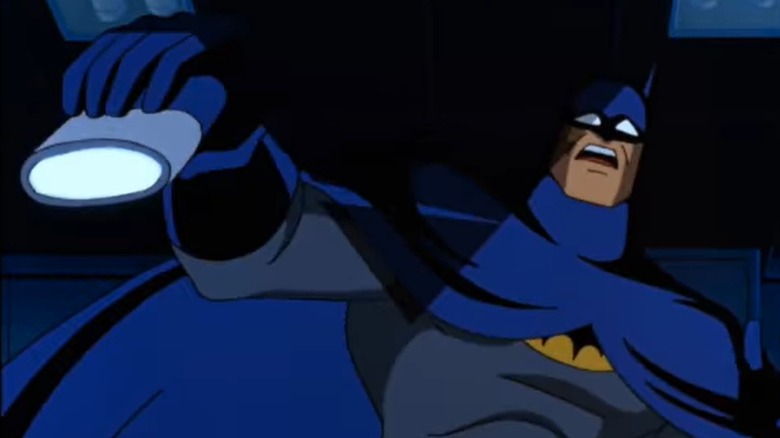The Most Infamous Cartoon Episodes To Ever Be Allowed On TV
Once considered to be strictly kids' stuff, the medium of animation has come a long way since the days of Saturday morning cartoons, which have pretty much disappeared. To be sure, animated series for kids have been and will almost certainly continue to be a mainstay of pop culture. But for decades, toons for grownups — from "The Flintstones" to "The Simpsons" to "South Park" — have filled a niche that live-action shows sometimes can't, often using the more fantastical aspects of the medium to tackle real-world situations in unique ways.
At times, some animated series have struggled to convey exactly which audience they are for; heck, the audiences themselves can sometimes be confused, as evidenced by the hardcore adult following of shows like "My Little Pony: Friendship is Magic" and the hand-wringing over whether children should be watching obviously adult shows like "South Park" and "Family Guy." Animated series in general, though, seem to share an interesting tendency: serving up highly controversial TV moments that some critics, fans, or special interest groups deem to be wildly inappropriate for their target audiences, whomever they may be.
South Park, '201'
When it debuted in 1997, "South Park" was not a series that anyone expected to run for 30 freaking years — but in 2021, series creators Trey Parker and Matt Stone inked a deal that will keep the adventures of Stan, Kyle, Cartman, and Kenny going on the small screen until at least 2027. With all of the extreme vulgarity, lewdness, and even graphic violence the show is known for, it's kind of a miracle that so few of its episodes have been outright banned — but one, Season 14's "201," has the distinction of only having been aired once in the United States.
It wasn't dirty words or other lewdness that doomed the episode, but a visual depiction of the Islamic prophet Muhammad, which is considered by some adherents of that religion to be blasphemous. When a fundamentalist Islamic group threatened violence over the episode, it — along with the preceding episode "200" — was effectively banned, with both episodes being pulled from the South Park Studios streaming site. Interestingly, the season 5 episode "Super Best Friends," which had featured a similar depiction, had come and gone with relatively little notice; when the furor arose over "201," though, it too was pulled from streaming, and to this day, none of these episodes are available on the series' streaming home, HBO Max.
Bluey, 'Dad Baby'
The Australian-British co-production "Bluey" has banked an absolute ton of goodwill during its run, because it's a singularly great kids' series; as good as it is at teaching kids how to be kids, it's arguably better at teaching parents how to be great parents. It's tough to imagine such a well-made, wholesome series ever fielding an episode too hardcore for its U.S. streaming home, Disney+ — but one installment, "Dad Baby," took the "teaching parents" thing to a rather hilarious extreme.
In the episode, Bluey's sister, Bingo, finds an old baby carrier, and when Bandit – their father — tries it on, Bluey decides it's time for the game that gives the episode its name. Bingo hops into the carrier, and Bandit comically pretends to be pregnant, which mostly consists of griping about how tough it is. Finally, a "birthing pool" (a kiddie pool, of course) is set up in the backyard, and Bandit "gives birth" to Bingo, who of course makes the whole process as unpleasant as possible.
It's all perfectly in keeping with the series' sweet aesthetic, but speaking with The Hollywood Reporter, creator Joe Brumm expressed his total lack of surprise that it would ruffle American feathers. Asked if he ever ran up against censorship issues, Brumm issued a decidedly affirmative chuckle before elaborating. "Eventually I would just hit these walls, and sometimes I'd say, 'Look, I can't change this. This is too funny,'" he said. "'Dad Baby' for instance, doesn't get shown in America. But what are you going to do, not make 'Dad Baby?' I love it."
Family Guy, 'Life of Brian'
When it comes to pushing the boundaries of good taste, Seth MacFarlane's long-running series "Family Guy" has, since the late '90s, been running neck-and-neck with "South Park" (whose creators famously hate the show). More than one episode of the series has come under fire from censors, but only one has come under significant fire from fans: the Season 12 episode "Life of Brian," which produced a rare moment in the cartoon that left viewers in tears. In the episode, the hard-drinking, drily sarcastic family dog Brian is struck by a car and dies — a circumstance that is played totally straight.
Shell-shocked viewers left waiting for a reversal were stunned when the episode concluded with a new dog, Vinny, joining the family — and Vinny was still around in the following episode, even (gasp) replacing Brian in the opening credit sequence. The uproar from fans was deafening, complete with a Change.org petition demanding Brian's return — and, as those fans probably should have known, they didn't have to wait for long.
In the very next episode after the Brian-less outing, Stewie used his old time machine to go back in time and prevent Brian's death, putting a swift end to the show's Vinny era (which, of course, had been the plan all along). Addressing the backlash, MacFarlane told reporters (via The Hollywood Reporter), "We were all very surprised — in a good way — that people still cared about that character [enough] to be that angry ... the rage was not something we counted on."
Ren and Stimpy, 'Stimpy's Invention'
Almost certainly the most egregiously unhinged series to ever ostensibly be aimed at kids, "The Ren & Stimpy Show," which ran for five seasons beginning in 1991, sometimes seemed engineered to test viewers' psychological fortitude; that it ran on Nickelodeon is nothing short of stupefying. The six-episode first season put short-tempered chihuahua Ren Hoek and loopy feline Stimpson J. Cat through a slew of frightening, disgusting, and similarly inappropriate situations. The Episode 3 segment "Space Madness" is often singled out as being among the most disturbing things to ever hit kids' TV, but that would be doing a disservice to the final segment of the season, the innocuously titled "Stimpy's Invention."
Said invention was a helmet that forces the perpetually cranky Ren to be happy, which has the effect of putting a great deal of stress on his psyche. This stress reaches a crescendo when Stimpy puts on his favorite song, "Happy Happy Joy Joy," a peppy little tune which features some inexplicably disturbing lyrics. As the song drones on, Ren, grinning like a lunatic, manages to take a hammer to the helmet (which is still on his head) and free himself from its clutches, at which point he begins throttling his buddy.
The segment is not only one of the darkest moments ever to grace Nickelodeon, but one of the most twisted things that ever appeared on American television; that anyone thought it was remotely appropriate for children boggles the mind.
Pokémon, 'Dennō Senshi Porygon'
In 1997, Pokémon was still a very green property; the anime series was in its first season, and was only aired in Japan. In the episode "Dennō Senshi Porygon" (or "Electric Warrior Porygon"), aspiring Pokémon master Ash Ketchum and his companions are sent into cyberspace to deal with a rogue Porygon, a digital Pokémon that is wreaking havoc on the Poké Ball transfer system. During a battle with the crime syndicate Team Rocket, virtual missiles are launched that result in several explosions — digital explosions, represented by a rapidly flickering red and blue strobe effect.
This was, of course, before the effects of strobing lights on some individuals were well-understood, and the episode (which was being watched by over four million children) resulted in literally hundreds of kids being rushed to hospital after suffering seizures. Pokémon was pulled from the airwaves for months while the cause of the incident was determined, and the episode was never broadcast again; of course, this meant that it became the stuff of legend, the episode that struck down hapless fans due to "Pokémon Shock." The incident led to a new set of standards for animation production in Japan, and a long-standing warning that aired in front of virtually all anime series instructing viewers to watch in a well-lit room at a safe distance from the TV.
Gargoyles, 'Deadly Force'
Overlapping for a season with the similarly dark "Batman: The Animated Series," the Disney-produced ABC series "Gargoyles" was a show that was unafraid to feature themes that may be considered a bit thorny for tweens. Centering on a group of (you guessed it) stone gargoyles that come to life to protect the denizens of New York City at night, the series featured morally ambiguous villains and was known to tackle issues such as racism and inner city violence. The Season 1 episode "Deadly Force" took its examination of the latter to an extreme; in it, the gargoyle Broadway, while playing with his friend (and police officer) Elisa's loaded gun, accidentally shoots and almost kills her.
The original version of the episode, which only aired once, actually showed Elisa lying in a pool of blood; after that airing, animators performed a quick hack job on the episode to remove that image. The cleaned-up version subsequently aired on cable channels such as Disney XD, but interestingly enough, some have claimed that a third version was streamed on Disney+. This cut shows the original bloody image (although more briefly), along with a shot of Broadway with his hands covered in blood, a shot which was not present in the original uncensored version.
Cow and Chicken, 'No Smoking'
The Cartoon Network series "Cow and Chicken" only ran for four seasons between 1997 and 1999, but it made quite an impression; like many of that network's offerings of the time, it was animated in a bizarre and surrealistic style, with a decided focus on gross, sarcastic, and at times suggestive humor. The title characters, who were somehow posited as biological siblings, undertook crazy adventures during which they were nearly always opposed by the villainous "Red Guy," who bore some striking similarities to, well, Satan. This was never explicitly stated, except for the time it pretty much was; in the pilot episode of the series.
The episode, entitled "No Smoking," saw Chicken's smoking habit becoming a source of irritation for his bovine sister, which in and of itself was a huge stretch for what was ostensibly a kids' show in the late '90s. Then, the Red Guy shows up, enticing Chicken straight to the bowels of Hell with the promise of another pack of cigarettes, prompting Cow to muster up the courage to save him. Unsurprisingly, the episode was promptly banned by Cartoon Network for all the reasons one might imagine after its first airing.
The Fairly OddParents, 'It's a Wishful Life'
Young Timmy, the protagonist of the long-running series "The Fairly OddParents," never exactly had it easy. Between his borderline neglectful parents, his sadistic babysitter Vicky, his school bully Francis, and his unhinged teacher Mr. Crocker, perhaps no boy has ever needed fairy godparents more. Unfortunately for Timmy, though, the ones he ends up with — the lunkheaded Cosmo and the put-upon Wanda — are not often of much help, usually granting the boy lofty wishes that only make things worse.
One Season 5 episode, "It's a Wishful Life," took its inspiration (obviously) from the classic film "It's a Wonderful Life," whose protagonist got to see just how crappy everyone's lives would have been if he had never existed. When poor Timmy wishes that he were never born, though, he gets to see exactly the opposite. In his absence, the lives of everyone in his orbit are, well, super-rad; his parents are rich, Mr. Crocker is a respected Harvard professor, and so on. As one might imagine, the message implicit in this story was not terribly well-received by fans, and to this day, it's the target of online vitriol and the subject of YouTube videos with titles like "The Fairly OddParents Episode [series creator] Butch Hartman Apologized For Making" (that also appears to be inaccurate) and "The Episode That Ruined Fairly OddParents."
Peppa Pig, 'Mister Skinnylegs'
It's tough to imagine any episode of the sweet, innocent preschool-age kids' series "Peppa Pig" being yanked from the airwaves, but it did indeed happen. The episode in question was "Mister Skinnylegs," in which Peppa's daddy comforts her when she happens upon a spider in her room. Spiders, he tells her, are very small and nothing to be worried about, because they're totally friendly and can't hurt you! At this point, it might be helpful to know that the British-produced "Peppa Pig" is also quite popular in Australia. And while Daddy Pig's advice is sound in Britain, Australia is a place where a whole lot of animals can absolutely hurt or kill you, including a great many decidedly not-friendly arachnid species.
ABC, the Australian public broadcast network, swiftly put the kibosh on the episode. However, it drew complaints from Aussie parents when it aired again on Nick Jr. The cable company went to bat for the episode, and it made some good points; the spider in question was not exactly realistic-looking, and was featured on a show in which the main character is a talking anthropomorphic pig. When the media began to take notice, though, the network grudgingly pulled the episode while continuing to insist that it really wasn't a big deal.
SpongeBob Squarepants, 'Mid-Life Crustacean'
While the beloved cartoon "SpongeBob Squarepants" has always had a tendency to get a little weird, it only got enough so to have an episode pulled from rotation once; to be fair, though, we're talking about getting "'80s teen sex comedy" weird. In the Season 3 episode "Mid-Life Crustacean," SpongeBob's boss Mr. Krabs finds himself getting a little down about his advancing age. To cheer him up, our hero and his best friend Patrick Star decide to bring him along for a fun, youthful activity: a panty raid.
To clarify, this means pretty much what you may imagine: sneaking into a woman's house to steal her underwear, and if it seems obvious that this is inappropriate subject matter for a kids' cartoon, that is because it absolutely is. But to make matters even worse, the raid's target house happens to be that of Mr. Krabs' elderly mother, who responds to the incident by grounding her adult son, which finally makes him feel like a kid again. Amazingly, the episode, which aired in 2003, was not pulled until 2018, which means that for fully 15 years, there were legions of confused parents having to avoid explaining to their children what a panty raid was.
Teenage Mutant Ninja Turtles, 'Insane in the Membrane'
In case you didn't know, "Teenage Mutant Ninja Turtles" wasn't always a goofy kids' property. It began as an underground, black-and-white comic that was grim, bloody, and heavily inspired by Frank Miller's legendary and equally grim run on Marvel Comics' "Daredevil" (a character who even contributed to the Turtles' weird real-life origin). As soon as the comic began to rise in popularity, creators Kevin Eastman and Peter Laird were apparently convinced that they could make a lot more money by pandering to children, and the "Cowabunga, Dude" version of the Turtles was born. All of that grimness was quickly rinsed away by a flood of cash, never to return until 2006, when the 4Kids animated series based on the Turtles gave impressionable pre-teens a fat jolt of body horror.
The episode, "Insane in the Membrane," features scientist Baxter Stockman under the thumb of the Shredder, who has permanently secured his scientific talents by literally stripping away body parts until he is reduced to being a brain in a jar. Stockman finds a way to implant his consciousness into a clone, a highly unstable one which begins falling apart, resulting in some of the most grotesque imagery ever to grace the 4Kids programming block — at least in the U.K. Horrified Fox execs pulled the episode from broadcast in the States, where it never saw the light of day until the series was picked up by Nicktoons in 2015.
Batman: The Animated Series, 'House & Garden'
Running for four seasons between 1992 and 1995, "Batman: The Animated Series" is considered by many fans to be the definitive portrayal of the Dark Knight and his universe in media. As such, it often got pretty unsettling, and while none of its episodes were banned by Fox Kids, there's one that perhaps should have been: "House & Garden," in which an attempt by Poison Ivy to go on the straight and narrow takes a hard turn into David Cronenberg territory.
The episode sees Ivy settling down, married to a professor and taking on the role of Mommy to his sons by a previous marriage. None of this, though, is as it seems: in reality, the happy husband is an unwilling participant in the union, and the children are essentially living plants spiked with his DNA. In a horrifying kicker of a sequence, some new, squirming tots, calling out for Mommy, are hatched from huge, bulbous plant pods, a sight which visibly shakes Batman himself, not to mention every hapless viewer.
